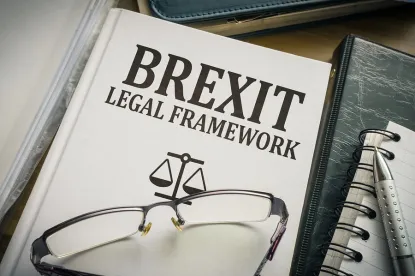On 28 February the EU27 produced a draft Withdrawal Agreement about which many have already written. Notably the UK had not previously produced its own draft (lawyers generally like to produce first drafts of documents as it gives control of the negotiation to them). To those of us unfortunate enough to live and breathe Brexit on a daily basis, there was little surprising contained within, and it merely reflected in legal form the principles contained in the December Joint Report.
In response to the draft agreement the key point of contention in the UK was the issue of the Irish border. Some slightly inflammatory language from the EU27 didn’t help calm choppy waters and led to accusations from some that the EU was seeking to “annex” Northern Ireland. Essentially the EU27 asserted the default of a “common regulatory area” between Northern Ireland and Ireland (i.e. Northern Ireland staying inside the Customs Union and Single Market) unless the UK could come up with a plausible alternative: either a very soft Brexit or the deployment of cutting-edge technology to eliminate the need for a hard border.
On 2 March Prime Minister Theresa May gave a speech at London’s Mansion House to set out her vision for the future economic partnership between the UK and the EU27. She reiterated why the Norwegian and Canadian models were not suitable for the UK:
“the Norway model, where we would stay in the single market, would mean having to implement new EU legislation automatically and in its entirety – and would also mean continued free movement. Others have suggested we negotiate a free trade agreement similar to that which Canada has recently negotiated with the EU – or trade on World Trade Organisation terms. But these options would mean a significant reduction in our access to each other’s markets compared to that which we currently enjoy.”
The speech was widely regarded as being more realistic on the compromises that the UK would need to make, for example that access to European markets would be diminished, the influence of the ECJ would continue to be felt in the UK, and that the UK would continue to participate in certain European agencies. It set out in some detail on how the UK could select certain benefits of trade within the EU as if it were a member, while also being free to enter into more favourable trade agreements with third countries. However, the Prime Minister did not provide any detailed additional alternative ideas on how the Irish border problem could be resolved without a “common regulatory area”.
Turning to the courts, yesterday The Hon. Mr Justice Supperstone declined to grant a request by the Good Law Project for a judicial review of the UK government’s refusal to publish its “secret” studies of the impact of Brexit on the UK economy, which it is widely assumed would suggest that the impact would be materially adverse. The Good Law Project has announced its intention to appeal Supperstone J.’s judgment. The underlying rationale behind the Good Law Project’s litigation appears to be that the release of such studies may be the catalyst for a wider change of public opinion towards Brexit, or at least the hard Brexit contemplated by the UK government, such that the government is forced to change its approach, or hold a second referendum. Public opinion has shown little evidence of significant or sustained change in relation to Brexit – broadly those who voted Leave would still vote Leave, and those who voted Remain would still vote Remain – and there is some evidence to suggest that Leavers would not change their mind even if forecasts suggested dire economic outcomes, partly because they don’t believe forecasts, and partly because their vote wasn’t mainly about economics. Meanwhile, the indefatigable Jolyon Maugham QC, the barrister behind the Good Law Project, is progressing a case in the Dutch courts as to whether the ECJ should determine whether Brexit means a loss of EU citizenship, which is relevant for the UK citizens currently living in the EU27 (and often exercising rights to freedom of movement, etc.). The First Instance Judge, Judge Bakels, agreed last month to refer the case to Luxembourg. The Dutch government has appealed the decision to refer and that case will be heard on 19 April 2018. As of today, the ECJ has not been asked to determine with Article 50 is unilaterally revocable or not.
In my view, although from time to time the EU27 indicates that the UK could revoke Article 50 and remain in the EU, there is little indication that there is a strong political desire in the UK or in the EU27 to stop the UK from formally leaving the EU on 29 March 2019. Even if the stubborn UK electorate were consistently to show a significant (60%+) desire to revoke Article 50, it’s hard to see this being done without a second referendum, and practically there is very little time to have a meaningful referendum before, as a matter of law, the UK leaves the EU in little more than 12 months. (It also remains unclear to me what the second referendum question would be – a straight re-run? ratifying the agreed deal or crashing out? ratifying the agreed deal or remaining in (but on what terms)?) Ultimately one senses that the outcome of Brexit-related litigation is unlikely to stop Brexit, or change its course.
Which brings us to today. Donald Tusk, President of the European Council, has given a press conference on the draft framework for the future relationship with the UK. This draft still needs to be signed off by the leaders of the EU27.
Tusk argued that, given the UK’s red lines on leaving the Single Market, Customs Union and ECJ jurisdiction “it should come as no surprise that the only remaining possible model is a free trade agreement”. His proposal was that “we aim for a trade agreement covering all sectors and with zero tariffs on goods. Like other free trade agreements, it should address services. And in fisheries, reciprocal access to fishing waters and resources should be maintained”. Zero-tariff trade is something with which the UK will agree, but reciprocal access to fishing waters is something the UK government wanted to end – both Michael Gove and Nigel Farage campaigned in the referendum on the basis of taking back control of British fish.
In terms of Theresa May’s position that the UK could seek to replicate synthetically only certain parts of Single Market membership the response was stark:
“No Member State is free to pick only those sectors of the Single Market it likes, nor to accept the role of the ECJ only when it suits their interest. By the same token, a pick-and-mix approach for a non-member state is out of the question. We are not going to sacrifice these principles. It’s simply not in our interest.”
He stated, not entirely accurately, that the UK, as a non-member of the EU, is not entitled to membership of EU agencies. This may be an issue the UK wishes to negotiate, and the EU27 may be minded to concede.
In terms of the guidelines themselves, a few points stand out:
- All-sector zero-tariff trade will be subject to “appropriate accompanying rules of origin”. This means that while the famed German car manufacturers will be able to export to the UK tariff free, as is currently the case, having a UK supplier as part of the chain may become less appealing than it is now, as outside the (or a) Customs Union, there is greater uncertainty and cost in determining the local content of any part of a product.
- On services, it is envisaged that trade in services will be covered. Also noteworthy is that “the FTA should include ambitious provisions on movement of natural persons as well as a framework for the recognition of professional qualifications”, i.e. an ambitious deal on services envisages a high degree of freedom of movement by EU27 and UK citizens across borders.
- There is a need for a new air transport agreement. Tusk specifically mentioned at the press conference the possibility that a “particularly absurd consequence of Brexit” could be the disruption of flights (as identified by Squire Patton Boggs’ Jens Rinze back in August 2017).
- The EU27 is concerned that due to the UK’s geographic proximity and economic interdependence with the EU27, the future relationship must contain “robust guarantees”. The proposal is that the FTA will prevent the UK undercutting the EU27 “with respect to competition and state aid, tax, social, environment and regulatory measures and practices”. Note that restriction on a country’s tax policy is generally not contained in an FTA.
- The guidelines end with an offer to reconsider the EU27’s position if the UK’s own position on its red lines were to “evolve”.
The offer – and it is just that, the basis of a negotiation – of the EU27 may best be described as giving the UK a Canadian-style deal with a few added extras, both rights and obligations. Which is what the UK says that it wants. But the detail of that offer may be a hard sell within the Conservative party and to the wide public, as the UK is not both eating its cake and having it.
As a regretful Donald Tusk said at the press conference:
“I fully understand and respect Theresa May’s political objective to demonstrate at any price that Brexit could be a success and was the right choice. But sorry, it is not our objective.”




 />i
/>i

